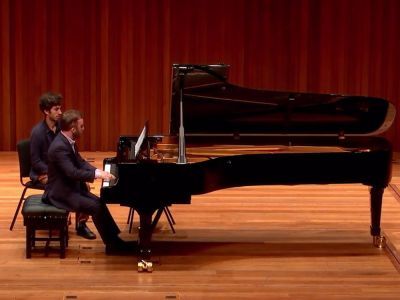Guildhall questions: Ben Smith answers

The LSO Platforms: Guildhall Artists recital series sees senior Guildhall musicians take to the Barbican Hall stage before LSO concerts with free performances of complementary repertoire.
On Sunday 5 May, talented Guildhall pianist Ben Smith offers the chance to hear the John Adams’ mesmeric Phrygian Gates prior to the London Symphony Orchestra’s evening performance of the American composer's Harmonielehre.
Ben Smith is a London-based performer and composer specialising in contemporary music. He is interested in – amongst other things – phenomenological and semiotic approaches to musical analysis, and compositional encounters with silence and repetition. Ben graduated from City, University of London in 2015, and began his postgraduate life at Guildhall School in 2016, where he studies with Laurence Crane and Rolf Hind.
What makes this piece so special?
There’s no doubt that this piece is a behemoth of the contemporary piano repertoire. It occupies a very interesting place in the history of American minimal and post-minimal music, and as well as being one of the first substantial solo piano works to employ minimal techniques developed in the 1960s and 70s.
By 1978, Steve Reich had written and performed works like Piano Phase (for two pianos) Four Organs, and Six Pianos, and there’s certainly a debt to Reich to be found in Adams’ employment of repeated cellular structures, pulsating patterns, and phasing ideas.
However, Adams moves away from Reich’s idea of form as pure process (the structure of Phrygian Gates is rigorously organised), and creates a sonic surface that seems to unfold organically, but is actually based on lots of constantly shifting patterns between the hands. Adams’ variegated and intricate moulding of the musical material creates a wonderful juxtaposition between wave-like pulses of sounds at a local level, and the sudden gated shifts of tonality and dynamic which evolve throughout the work.
What are your favourite moments in the piece?
The final section of super-fast semiquaver patterns, which fly between different harmonic clusters and keys is totally electric. But some of the moments that I’ve come to love the most are are often just fleeting instants within certain phases, where a particular alignment of a pattern between hands creates a gorgeously crunchy/open/sonorous/surprising harmony, which lingers in the pedal resonance.
What are the particular challenges in performing this piece and how have you solved them?
This piece requires an incredible amount of physical endurance; it’s a bit like running a marathon, or maybe dancing one! When practising, I kept coming back to questions like ‘how am I going to keep my energy strong for this section coming up?’, or saying things like ‘relax in this bit’, ‘save this build for the key change’ and so on.
After that, it’s really just a question of listening as much as possible. In a way, Phrygian Gates is an extended study in resonance, and it’s a real joy to listen to the ever-shifting colours and textures that occur in the morphology of the musical continuum.
Hear Ben Smith perform John Adams' Phrygian Gates in the Barbican Hall at 5.30pm on Sunday 5 May. Admission is free and unticketed.